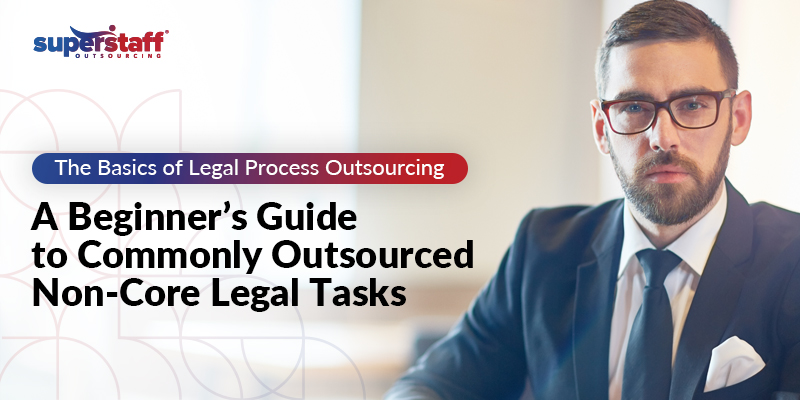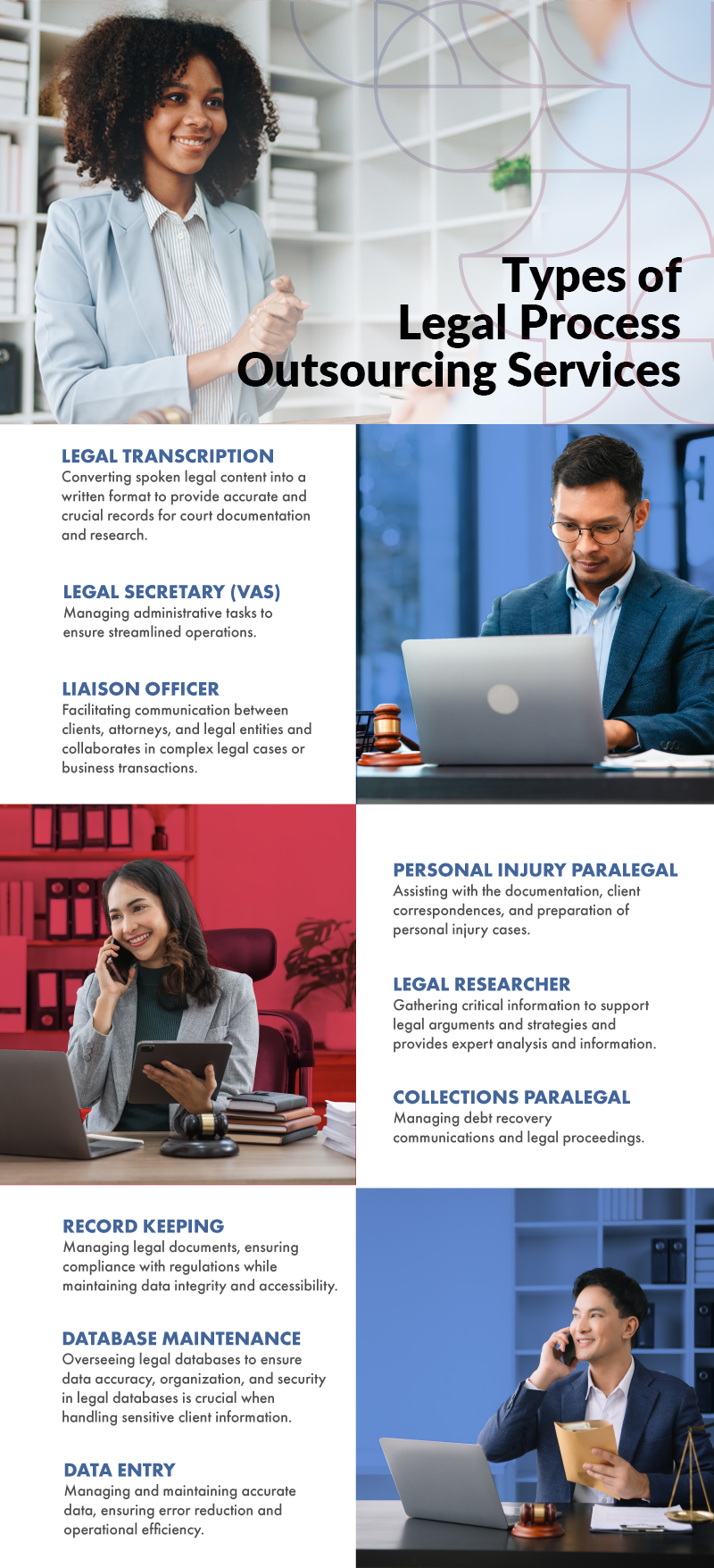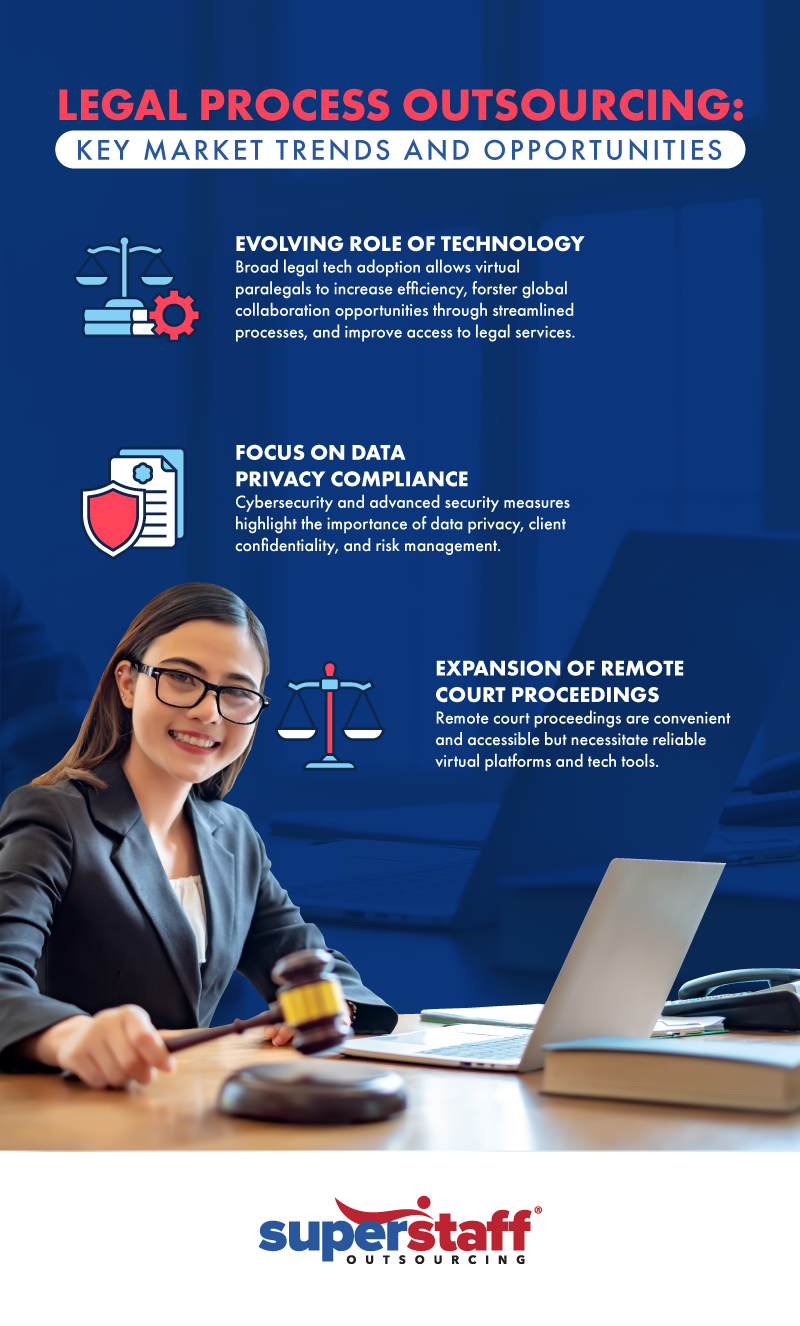
From financial constraints to increasing demand for improved services, law firms and legal departments face surmounting challenges in the post-pandemic era. In response, many are turning to alternative legal service providers as a strategic solution to boost efficiency and drive down costs without compromising quality.
A recent report from the Thomson Reuters Institute, the Center on Ethics and the Legal Profession at Georgetown Law, and the Saïd Business School at the University of Oxford revealed that alternative legal services providers (ALSPs) already account for $20.6 billion of the legal market — Legal Process Outsourcing (LPO) is a great example of this.
Let’s dive into the complex terrain of this outsourcing service to better understand the latest trends, technologies, and strategies shaping the industry’s future.
What Is Legal Process Outsourcing?
Legal Process Outsourcing involves hiring external providers for non-core tasks such as legal transcription, secretarial support, liaison roles, paralegal assistance, legal research, collections, record-keeping, database management, scheduling, and data entry.
Let’s dig deeper into each of these services.

Types of Legal Process Outsourcing Services
The workload of law firms and legal departments can be quite taxing, especially during peak seasons. Lawyers typically work around 50 hours per week, balancing various tasks such as court appearances, document preparation, legal research, and much more.
Amid this chaos, legal outsourcing services offer a compelling solution for delegating routine tasks. By freeing up lawyers and their in-house staff to focus on urgent and critical cases, LPO significantly enhances efficiency and productivity, maximizing their time, attention, and resources.
Legal Transcription
Legal transcription involves converting spoken legal content, such as court proceedings or depositions, into written format for easier convenience and accessibility.
Leveraging a deep understanding of legal terminology, transcriptionists create accurate records used for court documentation and legal research. These transcripts serve as crucial evidence in legal cases, providing attorneys, judges, and legal professionals with much-needed context for decision-making.
Ultimately, outsourcing transcription ensures accurate documentation of events, saving time for legal professionals and improving record-keeping efficiency.
Legal Secretary (VLA)
Virtual legal assistants (VLAs) excel at managing schedules, correspondence, and document preparation, making them invaluable for firms struggling to navigate resource constraints.
With VLAs managing routine administrative tasks, law firms can ensure seamless client communications for maximum client satisfaction and higher-quality service. VLAs also provide critical support in scheduling, record-keeping, and case preparation, empowering law firms to focus on core operations, thereby enhancing overall efficiency and client service.
Liaison Officer
Seamless information exchange is absolutely critical in the intricate legal landscape — and liaison officers play a crucial role in this, facilitating communication between clients, attorneys, and legal entities for smooth and efficient information flow. They act as vital intermediaries, managing the exchange of information among various parties involved in legal cases or business transactions.
Smaller legal firms or private practitioners often lack the resources or headcount to manage communication between multiple parties in complex legal cases or business transactions. Fortunately, outsourcing provides a strategic solution. With an outsourced liaison officer, legal practitioners can focus more on core legal work while leaving the intricate task of managing communications to a dedicated expert.
Personal Injury Paralegal
In an industry where time is money, paralegals specializing in personal injury cases play a vital role in timely documentation, client communication, and case preparation.
These cases typically often involve extensive paperwork, from medical records to accident reports. Specialized paralegals excel at organizing and managing these documents, ensuring that all necessary information is accurately recorded and readily accessible.
They also gather and analyze evidence, prepare legal documents, and organize trial materials. Their expertise ensures that every aspect of the case is meticulously prepared, increasing the likelihood of legal success.
Outsourcing paralegal tasks is a game-changer, allowing lawyers to manage their caseloads more efficiently by delegating time-consuming tasks to skilled professionals.
Legal Researcher
All legal cases require comprehensive research, from case preparation and policy-making to compliance and academic study — and this is where legal researchers step in.
They delve into legal precedents, statutes, and case law to provide valuable insights that support arguments and strategies. As legal research consumes time, outsourcing this task empowers lawyers to focus on more complex case preparations. This enhances efficiency, ensuring that research is conducted meticulously by professionals dedicated to this critical function.
With dedicated researchers handling the detailed work of gathering and analyzing information, attorneys can concentrate on formulating strategies and preparing for court, ultimately improving the quality of their legal representation.
Collections Paralegal
While lawyers are focused on their cases, outsourced collection paralegals manage financial risks and recover debts, ensuring a positive return on investment (ROI) for legal firms and their clients.
Focusing on the cash flow and ROI, these outsourced professionals ensure the firm’s healthy bottom line and overall financial stability.
Record-Keeping
Accurate records are indispensable in all legal proceedings, as they provide essential proof and documentation needed for ongoing hearings. These ensure that all necessary documents are readily available for review by courts, clients, and regulatory bodies.
Outsourcing these services reduces the burden of routine administrative tasks, ensuring accurate data even with loads of paperwork for the firms.
Database Maintenance
When it comes to handling sensitive client data, efficient database management is absolutely non-negotiable.
Outsourced data management experts ensure the accuracy, organization, and security of databases, to maintain their integrity and reliability.
Data Entry
With law firms relying heavily on accurate data for case information and client and financial records, data entry stands as yet another critical LPO service.
Data entry specialists help legal practitioners focus on core legal functions while enhancing operational efficiency. Leveraging their ability to handle large volumes of information with a high degree of accuracy, these specialists help minimize mistakes that can lead to significant issues in legal cases or financial management.
Legal Process Outsourcing: Key Market Trends and Opportunities
How does the legal landscape look now? Let’s examine the latest legal process outsourcing trends to better understand this solution.
Evolving Role of Technology
Virtual paralegals are witnessing a transformative shift as the industry integrates increasingly advanced tech tools like AI when performing legal outsourcing tasks.
This shift is accompanied by the increased adoption of remote collaboration tools such as digital workspaces and video teleconferencing, for seamless communication and globalized teamwork.
Meanwhile, emerging technologies such as eDiscovery tools, online legal platforms, and cloud-based collaboration tools enhance efficiency, accessibility, and security when rendering outsourced legal services.
Focus on Data Privacy Compliance
Due to the nature of legal work, there’s a growing demand for cybersecurity, highlighting the importance of advanced training and the adoption of more robust security measures.
As a result, data privacy compliance has become a prominent trend within the industry. Here are a few key factors shaping this trend:
- Data privacy regulations, such as the EU’s General Data Protection Regulation (GDPR)
- Advanced encryption and secure cloud storage for data protection
- Diverse data laws across the globe
- Eroding client trust
Expansion of Remote Court Proceedings
Remote court proceedings have become increasingly prevalent as legal activities shift from physical courtrooms to virtual platforms. This change is driven by the need for convenience improved accessibility, and adaptability to global disruptions such as the COVID-19 pandemic.
During the height of the pandemic in April 2020, daily Zoom meetings had risen to over 300 million. In Texas alone, there were 1.1 million remote proceedings in February 2021. These numbers highlight the need for more platforms to accommodate online meetings — and, ultimately, legal proceedings.
Such proceedings leverage video conferencing tools, electronic document management systems, and digital signatures. These technologies enable lawyers, judges, witnesses, and other participants to engage remotely while preserving the essential aspects of legal procedures like hearings, depositions, and trials. However, while this transition offers benefits like enhanced convenience and accessibility, it also brings challenges related to cybersecurity, procedural fairness, and technical reliability.
FAQs About Legal Process Outsourcing
What Does Outsourcing Mean in Law?
Outsourcing in law entails delegating non-core or routine legal tasks to external providers. This practice offers benefits like cost reduction, access to specialized skills, and increased efficiency.
You can outsource legal research, document review, and administrative functions, allowing lawyers and similar legal practitioners to concentrate on core legal activities.
What Is the Difference Between BPO and LPO?
Business Process Outsourcing (BPO) involves delegating non-core business functions like customer support to external providers. Meanwhile, Legal Process Outsourcing (LPO) is dedicated specifically to legal tasks like research and contract drafting. Generally, BPO covers a broader range of business functions, while LPO is focused solely on legal services.
How Does LPO Benefit Law Firms and Legal Departments?
LPO reduces operational costs by acquiring specialized legal expertise. Allowing third-party partners to handle specific legal processes frees up time for core tasks and enables strategic resource allocation for growth and competitiveness.
What Are the Key Considerations When Choosing an LPO Provider?
When choosing an LPO partner, scrutinize the vendor’s legal expertise, data security measures, cost-effectiveness, client feedback, and technological capabilities to ensure efficient legal support, compliance, and a reliable partnership.
What Role Does Technology Play in Enhancing LPO Services?
Technology streamlines legal processes by improving data security, enabling remote collaboration, providing data analytics for informed decisions, and offering cost-effective solutions.
Maximize Legal Efficiency with Legal Outsourcing
Legal Process Outsourcing isn’t just about cutting costs; it’s about optimizing legal workflows to achieve your business goals efficiently.
With our full suite of non-core legal services, SuperStaff is a nearshore call center partner that can streamline your back-end while you focus on critical legal functions, business development, and other profit-driving initiatives. Leveraging our commitment to excellence, we specialize in streamlining processes, maintaining compliance, and offering cost-effective solutions that fuel your legal triumphs.
Outsource to the Philippines with SuperStaff today to unlock efficiency, alleviate operational burdens, and drive success in your legal endeavors. Contact us today to learn more!






